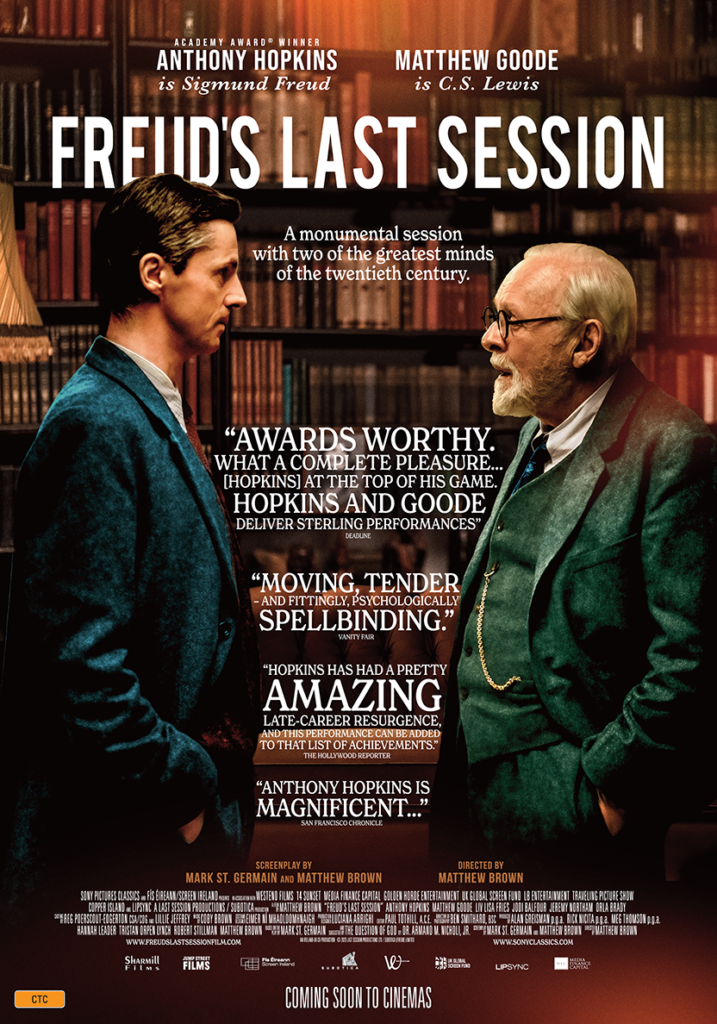The story is set in 1939 London, where tensions are high as the German forces have recently invaded Poland. The story’s protagonist is C.S. Lewis (Matthew Goode), and he is joined by Sigmund Freud (Anthony Hopkins). After reading C.S. Lewis’ latest book, Pilgrim’s Regress, Freud contacted Lewis, asking for an open conversation between them about the existence of God and the future of humans. Today is the day they are to meet, and both men wake up and start their day while listening to the radio and hearing updates about the war. Having survived the last war, C.S. Lewis remains optimistic despite the current state of the world. As C.S. Lewis arrives at Freud’s home for their meeting, he apologises for being late due to the evacuation of children travelling by train to the countryside. Freud mentions that he has several meetings scheduled for the day, and their meeting needs to be brief. Throughout their conversation, some moments become firm and heated. It also doesn’t help that Freud is experiencing pain and urgently needs medicine to be delivered to his home.
Freud’s Last Session is a drama film directed by Matt Brown and is based on a stage play by Mark St. Germain, which in turn is based on the book The Question of God by Armand Nicholi. Brown previously directed The Man Who Knew Infinity in 2015. The film mainly centres around the possibility that C.S. Lewis and Sigmund Freud met for a discussion. We are shown various flashbacks from their past and their experiences, all linked to their beliefs concerning their faith in Christ.
It should not be surprising that Matthew Goode and Anthony Hopkins were well-suited for their roles in this film. The spoken dialogue makes it feel like a stage play, and both actors deliver compelling and believable performances. Visually, the time period is convincingly portrayed through the costumes and the overall look of Freud’s home and office, which was a striking touch. I was highly engaged with the film when both men spoke openly with one another.
The topic of the conversation is touching, and it’s great to see a “friendly debate”. However, while providing more details about the leads, the flashbacks in the film shift the tone and take away from the more robust performance by Hopkins. It would have been better if the characters had explained their past instead of viewers being shown flashbacks, which also slowed the film’s pace compared to the snappy back-and-forth conversations between C.S Lewis and Sigmund Freud. Nevertheless, the ending is rewarding, impactful, and informative for those unfamiliar with any details surrounding this time.
Overall, Freud’s Last Session is a drama film that successfully converts a stage play to the big screen. The movie has solid dialogue, and both Anthony Hopkins as Sigmund Freud and Matthew Goode as C.S Lewis deliver compelling performances. The visuals, including the look and style of Freud’s home and costume designs, are well-suited for the film. It’s a captivating story about two men sharing a dramatic discussion about faith, all things surrounding Christ and the future of humans. However, the film’s slow moments, consisting of flashbacks, hinder the story significantly, slowing the pace and causing a loss of interest for the audience.
Freud’s Last Session (2023) is available in Australian Cinemas from April 18th!
6.1/10
31st March 2024
Written by Peter Walkden



Walkden Entertainment Podcasts Are Now Available!



![FLS_080323_PR_0363[7]](https://walkdenentertainment.com/wp-content/uploads/2024/03/FLS_080323_PR_03637.jpg)
0 Comments